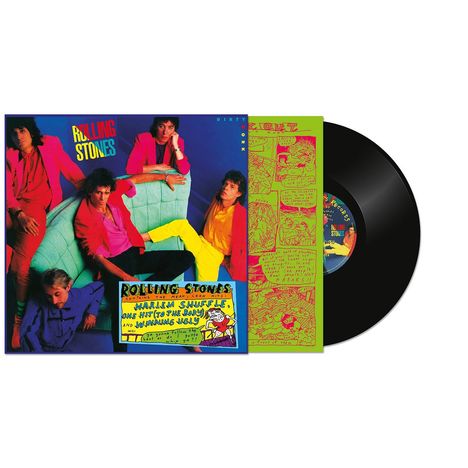The Rolling Stones: Dirty Work (remastered) (180g) (Half Speed Master) auf LP
Dirty Work (remastered) (180g) (Half Speed Master)
Die gute alte Vinyl - Langspielplatte.
(soweit verfügbar beim Lieferanten)
Vinyl liefern wir innerhalb Deutschlands immer portofrei.
- Label:
- Polydor
- Aufnahmejahr ca.:
- 1986
- Artikelnummer:
- 9757658
- UPC/EAN:
- 0602508773280
- Erscheinungstermin:
- 26.6.2020
Weitere Ausgaben von Dirty Work |
Preis |
|---|---|
| CD, (Limited Japan SHM-CD) | EUR 24,99* |
| CD, (2009 Remastered) | EUR 12,99* |
| CD, (SHM-CD) (Papersleeve), Japan-Import | EUR 26,99* |
The Rolling Stones' 18th studio album was released in 1986, having been recorded under the toughest possible circumstances. It is astonishing that it was ever made. Less astonishingly, it's a superbly accomplished set of songs that once again proved the Stones' critics wrong.
Few albums get made under such difficult circumstances as those that surrounded Dirty Work.
For a start, after the release of She’s The Boss, Mick’s first solo album less than a year previously, the making of which Keith initially saw as an act of grave betrayal, Mick and Keith’s relationship was under severe pressure. Mick would go on to play a solo set at Live Aid while Keith and Ronnie played with Bob Dylan. There was a major, major division between the two main components in the musical and emotional engine of the band.
For another thing, both Charlie and Ronnie were dealing with personal problems, “a mid-life thing” for Charlie and longer-term behavioural issues for Ronnie, both involving chemical dependencies, meaning that health and reliability problems added to the strain.
Most traumatic of all, and a genuine tragedy, in the December before the record’s release, founder member of The Rolling Stones Ian Stewart had died of a heart attack. He was just 47 years old. His sudden death hit all of the band hard and took away something that could not be replaced.
The sessions – held in Paris between April 8 and June 17 – were often split into two camps, with Jagger recording his vocals after the rest of the band had completed their parts. Sessions would officially begin around 9pm, but Keith and Ronnie sometimes wouldn’t show until 9am and then they’d want to play all day and all night. Producer Steve Lilywhite said at the time, “I don’t want to say too much about it. It’s Keith’s album to a great extent. He wrote the songs because of Mick’s solo commitments.”
A proposed tour – which contemporary accounts suggest would have made the band somewhere north of $40m – never materialised. Jagger sent each of the band an identical telex informing them he would not be touring. There was just one show played at the 100 Club for friends and family. Charlie and Ronnie needed time to straighten out. Mick and Keith needed to be back in contact. Bill just retreated to the south of France, only to pop up on The Benny Hill Show every now and again. A feature in the American magazine Spin – written by former NME journalist Nick Kent – wondered whether it was all over, whether, “the baddest, oldest rock and roll band in the world has run out of reasons for staying together.”
If The Rolling Stones had been a patient, it’s safe to say that it would have been in intensive care at this point, with all the machines measuring critical factors flatlining. How can you possibly get past all those problems and make a record everyone can get behind? Here was a band facing up to a near quarter century of making great music and popular cultural history, and wondering what to do next. And no one really knew.
From this absolutely unpromising situation came forth Dirty Work. Which goes like this. And, despite the mess it was born out of, rocks like a boulder. One Hit (To The Body) is a propulsive rocker cut through with some powerful backing vocals. The band might have been in crisis, but the mid-section of the song, where it breaks down to Mick’s vocal, Keith’s guitar and Charlie’s drums, still rattles with emotion - the feeling is still so obviously there.
Fight took things even further – the big extended chords and sharp, needly drums are entirely 80s, but there is a fire underneath it, and it’s an angry, buzzing wasp of a song.
“Wanna do it in the broad daylight,” Mick sings, “I’m the truck, I’m the suicide…” This is not a group of men sinking into easy middle-age. Hold Back is another fully-committed, throat-tearing roar of a song, Mick sounding mad and furious and right in the groove while the band hammer it down tight.
Keith shares Too Rude’s lead vocal with Jimmy Cliff and the track turns into a sweetly deep, dubbed-out treat, while Mick’s Winning Ugly is a shuffling, airy, synth-led piece that rolls forward on a relentless Wyman bassline. “I was brought up to cheat,” he sings, “as long as the referee isn’t looking…”
Back To Zero was co-written with keyboard player Chuck Leavell just a few days after Stu had told him the best thing he could do with this infernal machine was to, “throw it in the ocean…”
The title track is a brutally simple rocker, an example of a band who can pull the goods out of the bag when they have to. Ronnie and Keith’s guitars trade sparkling, jangling lines while Charlie leans hard into his kit. Had It With You is a computerised Delta-blues, a band-in-a-box vibe with a pulsing harmonica solo and some intentionally hilarious Beatles-like harmonies from a multi-tracked Jagger.
Then there’s Sleep Tonight, a deliciously blue country-rocker sung by Keith and Tom Waits that rides a beautiful circular piano line, and is hung on the support of a rich gospel-hued backing vocal. It’s a wonderfully potent song. This then is not the album you think it is, much less the one you’ve been told it is.
“Yes the relationships were terrible,” Mick said some time later. “Health was diabolical. The rest of the Stones couldn’t walk across the Champs Elysees, much less go on the road…”
And yet, for all that, they still pulled it together, still kept moving, still added another chapter to the story. As they entered their 25th year the Rolling Stones were still a mighty, mighty force. (rollingstones.com)
LP
-
1 One Hit (To The Body)
-
2 Fight
-
3 Harlem Shuffle
-
4 Hold Back
-
5 Too Rude
-
6 Winning Ugly
-
7 Back To Zero
-
8 Dirty Work
-
9 Had It With You
-
10 Sleep Tonight
-
11 Key To The Highway (Piano Instrumental)
Mehr von The Rolling Stones
-
The Rolling StonesHavana Moon (180g) (Limited Edition)3 LPs, DVDAktueller Preis: EUR 36,99
-
The Rolling StonesBig Hits (High Tide & Green Grass)LPAktueller Preis: EUR 24,99
-
The Rolling StonesLet It Bleed (50th Anniversary) (180g)LPAktueller Preis: EUR 31,99
-
The Rolling StonesSteel Wheels (remastered) (180g) (Half Speed Master)LPAktueller Preis: EUR 24,99






